Manifest Destiny.
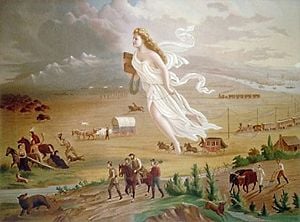
n the 19th century, manifest destiny was a widely held belief in the United States that its settlers were destined to expand across North America. There are three basic themes to manifest destiny:
- The special virtues of the American people and their institutions
- The mission of the United States to redeem and remake the west in the image of agrarian America
- An irresistible destiny to accomplish this essential duty[3]
Historian Frederick Merk says this concept was born out of "a sense of mission to redeem the Old World by high example ... generated by the potentialities of a new earth for building a new heaven"
Stephen Foster.

Stephen Collins Foster (July 4, 1826 – January 13, 1864), known as "the father of American music", was an American songwriter primarily known for his parlor and minstrel music. Foster wrote over 200 songs; among his best-known are "Oh! Susanna", "Hard Times Come Again No More" , "Camptown Races", "Old Folks at Home" ("Swanee River"), "My Old Kentucky Home", "Jeanie with the Light Brown Hair", "Old Black Joe", and "Beautiful Dreamer". Many of his compositions remain popular more than 150 years after he wrote them. His compositions are thought to be autobiographical. He has been identified as "the most famous songwriter of the nineteenth century" and may be the most recognizable American composer in other countries. His compositions are sometimes referred to as "childhood songs" because they have been included in the music curriculum of early education. Most of his handwritten music manuscripts are lost, but copies printed by publishers of his day can be found in various collections.
Beautiful Dreamer.
My Old Kentucky Home.
Six Feet Under (TV Series).

Six Feet Under is an American drama television series created and produced by Alan Ball. It premiered on the premium cable network HBO in the United States on June 3, 2001 and ended on August 21, 2005, spanning five seasons and 63 episodes. The show depicts members of the Fisher family, who run a funeral home in Los Angeles, and their friends and lovers. The series traces these characters' lives over the course of five years. The ensemble drama stars Peter Krause, Michael C. Hall, Frances Conroy, Lauren Ambrose, Freddy Rodriguez, Mathew St. Patrick, and Rachel Griffiths as the show's seven central characters. The series was produced by Actual Size Films and The Greenblatt/Janollari Studio, and was shot on location in Los Angeles and in Hollywood studios.
George Eliot.
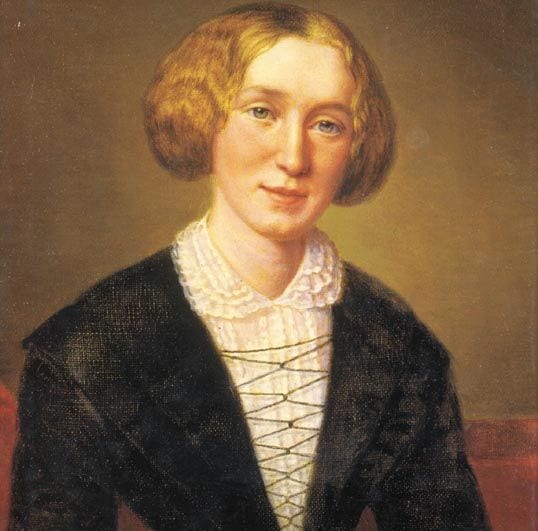
Mary Ann Evans (22 November 1819 – 22 December 1880; alternatively "Mary Anne" or "Marian"), known by her pen name George Eliot, was an English novelist, poet, journalist, translator and one of the leading writers of the Victorian era. She is the author of seven novels, including Adam Bede (1859), The Mill on the Floss (1860), Silas Marner (1861), Felix Holt, the Radical (1866), Middlemarch (1871–72), and Daniel Deronda (1876), most of which are set in provincial England and known for their realism and psychological insight.
The mill on the floss.
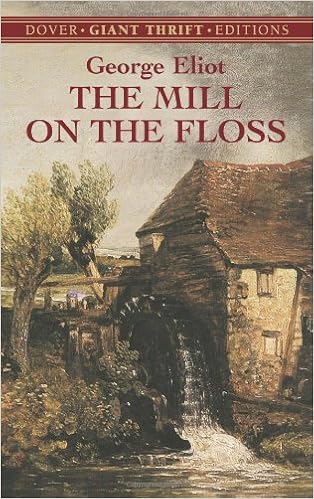
The Mill on the Floss is a novel by George Eliot (Mary Ann Evans), first published in three volumes in 1860 by William Blackwood. The first American edition was published by Thomas Y. Crowell Co., New York.
Middlemarch.

Middlemarch, A Study of Provincial Life is a novel by English author George Eliot, first published in eight instalments (volumes) during 1871–2. The novel is set in the fictitious Midlands town of Middlemarch during 1829–32,[1] and it comprises several distinct (though intersecting) stories and a large cast of characters. Significant themes include the status of women, the nature of marriage, idealism, self-interest, religion, hypocrisy, political reform, and education.
Middlemarch.

Middlemarch, A Study of Provincial Life is a novel by English author George Eliot, first published in eight instalments (volumes) during 1871–2. The novel is set in the fictitious Midlands town of Middlemarch during 1829–32,[1] and it comprises several distinct (though intersecting) stories and a large cast of characters. Significant themes include the status of women, the nature of marriage, idealism, self-interest, religion, hypocrisy, political reform, and education.
Charlotte Bronte.
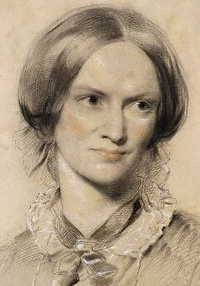
Charlotte Brontë (/ˈbrɒnti/, commonly /ˈbrɒnteɪ/;[1] 21 April 1816 – 31 March 1855) was an English novelist and poet, the eldest of the three Brontë sisters who survived into adulthood and whose novels have become classics of English literature. She first published her works (including her best known novel, Jane Eyre) under the pen name Currer Bell.
Jane Eyre.
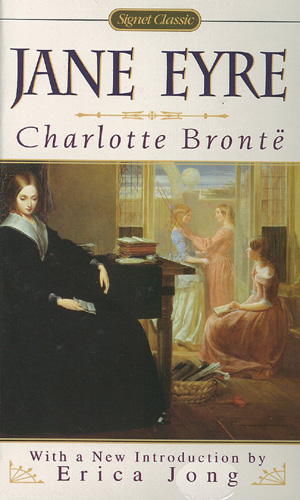
Jane Eyre /ˈɛər/ (originally published as Jane Eyre: An Autobiography) is a novel by English writer Charlotte Brontë. It was published on 16 October 1847, by Smith, Elder & Co. of London, England, under the pen name "Currer Bell." The first American edition was published the following year by Harper & Brothers of New York.
Primarily of the Bildungsroman genre, Jane Eyre follows the emotions and experiences of its eponymous heroine, including her growth to adulthood and her love for Mr. Rochester, the Byronic[1] master of fictitious Thornfield Hall. In its internalisation of the action—the focus is on the gradual unfolding of Jane's moral and spiritual sensibility, and all the events are coloured by a heightened intensity that was previously the domain of poetry—Jane Eyre revolutionised the art of fiction. Charlotte Brontë has been called the 'first historian of the private consciousness' and the literary ancestor of writers like Joyce and Proust.[2] The novel contains elements of social criticism, with a strong sense of morality at its core, but is nonetheless a novel many consider ahead of its time given the individualistic character of Jane and the novel's exploration of classism, sexuality, religion, and proto-feminism.
An Affair to Remember.
An Affair to Remember is a 1957 DeLuxe Color film starring Cary Grant and Deborah Kerr, directed by Leo McCarey, and filmed in CinemaScope. It was distributed by 20th Century Fox. The film is considered one of the most romantic movies of all time, according to the American Film Institute.[3] The film was a remake of McCarey's 1939 film Love Affair, starring Irene Dunne and Charles Boyer.
Vocabulary.
1. Emeritus.

Pronunciation:
Definition: adjective
(usually postpositive) retired or honourably discharged from full-time work, but retaining one's title on an honorary basis
Example
Sentences:
2. Evacuate.

Pronunciation:
Definition:
1. (also intr) to withdraw or cause to withdraw from (a place of danger) to a place of greatersafety
3. Mortified.

Pronunciation:
Definition:
having been offended or embarrassed
Example
Sentences:
4. Fallacious.
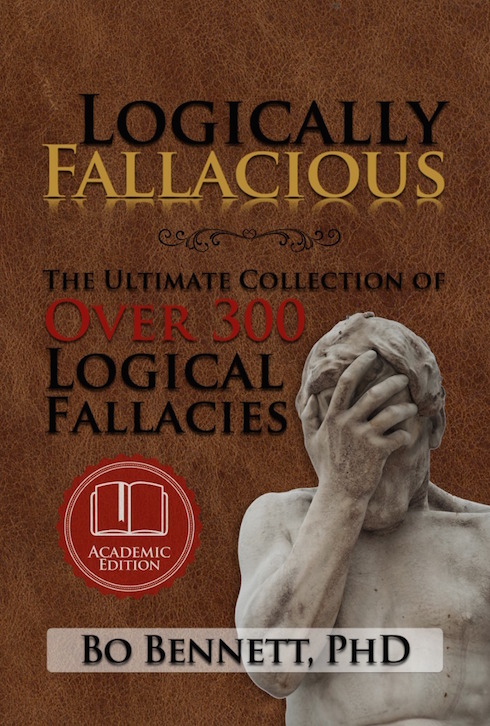
Pronunciation:
Definition: adjective
2. tending to mislead
5. Engagement.

Pronunciation:
Definition:
2. an appointment or arrangement, esp for business or social purposes
Example
Sentences:
6. Lien.

Pronunciation:
Definition:
7. Concrete.

Pronunciation:
Definition:
1.
a. a construction material made of a mixture of cement, sand, stone, and water that hardens to a stonelike mass
b. (as modifier) ⇒ a concrete slab
Example
Sentences:
8. Sustainability.

沒有留言:
張貼留言